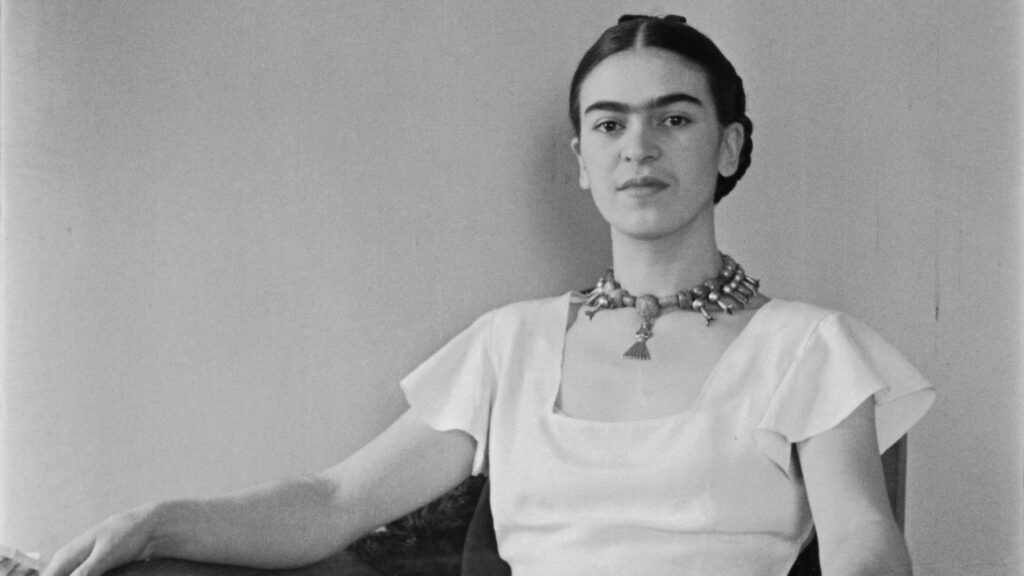Note: This final dispatch allowed the writer to select their own virtual viewings, leading to alternate takes on “Frida” and “Luther: Never Too Much.” Read Monica Castillo’s here for comparison.
I wanted to explore the arts through Sundance’s Episodic, US Documentary and Premiere showings this year. After exploring films in the US Documentary category, and then watching “Frida,” I understood why she is such a stellar character to focus on. “Frida,” directed by Carla Gutierrez, captures Frida Kahlo in the most transparent fashion viewers have ever seen outside of her art. I was awestruck by the animation, rawness and beauty of the documentary. “Lolla: The Story of Lollapalooza” was a teenage interest of mine. As a Chicago native, I have attended the festival a handful of times (with free tickets from After School Matters) and was adamant about claiming Chicago’s history as my own. Finally, it was time to watch the Sundance Premiere I had been waiting for, “Luther: Never Too Much,” and, in stark contrast to “Lolla,” it was the epitome of soul, elegance and timelessness.
Diary accounts of Frida’s life make the documentary “Frida” seem autobiographical; paired with animations of her paintings, the doc takes you through the mind of the legendary artist. Premiering March 15th on Amazon Prime Video, “Frida” is an artist’s story that the world should see. Her exuberant way of loving, her rebellious way of living and her life-changing accident garner deep attachment to her ancestral spirit. Frida fought for her life, and the praise we give her posthumously, by being herself. Nothing about Frida was normal, from her boyish way of dressing to her love of women, she defied all societal rules. Her peers at school would say, “Frida is a little strange.” The biographical accounts from friends and lovers offer insight on how she was perceived and treated.
The documentary is bright and historical. In addition to learning about Frida, Gutierrez draws attention to Diego Rivera, famed muralist and husband to the artist. Her self-portraits, highlighted throughout the documentary, are reflections of her reality. Frida used the essence of the world as her inspiration to create. “Deciphering the world was like a game,” she writes. Frida was a communist, called a surrealist (although she hated that categorization), and despised stuck-up gringos. The variants in her lifestyle are thrilling to understand while watching the flowing picture. “Frida,” the documentary, is a lovely piece of art that furthers her legacy.

As the episode opens, Perry Farrell of Jane’s Addiction sits in the middle of a room surrounded by a projected desert landscape as he goes through a retrospective process of the creation and impact of Lollapalooza, while drinking wine straight from the bottle. The traveling music festival was intended to be a farewell party for Jane’s Addiction, but has since turned into an annual festival based solely in Chicago. The episode features interviews of band participants, as well as footage of the festival and its creation. Aspects of the festival including social activism before internet access, rebellious youth, and limitless access to drugs and alcohol are highlighted in the episode. Farrell recalls getting “so f*cked up,” he missed a groundbreaking introductory moment for his band, Jane’s Addiction. An audience member is spotted saying, “My mom loves me even though I do drugs.”
The festival, deemed “live music from a dark place,” historically featured artists like Red Hot Chili Peppers, Living Colour, Siouxsie and The Banshees and Body Count. The first episode highlights the first show in Chicago featuring Ice-T of Body Count and Perry Farrell of Jane’s Addiction singing Sly Stone’s “Don’t Call Me N*gger, Whitey.” The performance is horrendous, but both parties justify singing it. Ice-T claims the festival is for white kids because they can afford it but insists that the Sly Stone rendition performance was a smart move.
The festival, named after fantastical imagery of giant lollipops, is a gathering of “misfits,” including goths, punk rockers, and suburban white kids. The idea that the festival started pre-phones and with only one stage is fascinating because the attendees were more receptive to the ideas being shared, including Body Count’s “Cop Killer,” which was performed right after the Rodney King brutalization. Perry Farrell states that the performances of “Cop Killer” were outrageous and courageous, and I would say the festival in its totality holds the same reputation.

Luther Vandross’ legacy is essential to the music industry. A producer of countless bangers, jingles and music of other artists in the industry, Luther gave his all and director Dawn Porter creates a stunning vision of his enormity in “Luther: Never Too Much”. Sony Productions does not leave this documentary short of songs; Luther had hits and you will find yourself singing along to every one of them. Vandross was a child of Motown and loved listening to The Supremes. Diana Ross, Aretha Franklin and Dionne Warwick, served as his greatest inspirations and he eventually produced songs for his idols. Luther Vandross was surely at the top, even when he did not feel that way, and that insecurity is also displayed in the film.
Mariah Carey, Jamie Foxx and Clive Davis are some of the featured industry folk that talk about their experiences alongside Luther Vandross. His mother supported his dream of being in music and the fact that he had to drop out of college to pursue it. His father, who died when he was just eight years old, was a singer himself and inspired the song “Dance with my Father”.
Although his music is associated with lovemaking in the Black community, Vandross said he wanted to be known as a premier singer of our day. He was able to adapt to the fast-changing industry, even when hip-hop took the lead on the charts. Luther Vandross may have been viewed as too adaptable when it came to the beauty standards of the entertainment industry, his weight ever-fluctuating, but that did not hinder the range of his voice until near the end of his life. And as for his sexuality, Luther says, “mind your effing business.” “Luther: Never Too Much” will knock you off your feet and have you dancing in your seat.












